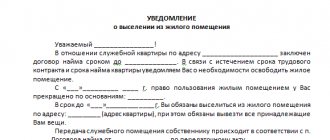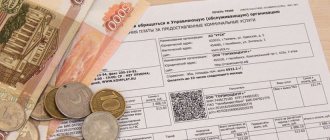Eviction from an apartment for debt has become a cruel reality that has developed over the past 20 years. There are two main reasons: mortgage – non-payment of mandatory payments and debts for housing and communal services. The last reason applies not only to municipal residents living under social tenancy agreements, but also to homeowners who acquired ownership rights during the privatization process or purchased square meters of real estate with personal funds.
We will talk about how eviction for non-payment of utilities occurs in this article.
Eviction from an apartment due to utility debts
The possibility of eviction from a residential premises is provided for by current legislation. The main regulatory act is the Housing Code of the Russian Federation (LC), containing Art. 84,85,90 and 91, providing for different grounds for eviction and different legal consequences. However, in the Housing Code, eviction, as a measure of influence on the resident, is provided only for those who have received the right to reside on the basis of a social tenancy agreement.
However, there is another, large part of the residents of apartment buildings - the owners. It is also possible for them to have legal consequences in the form of eviction, but they are regulated by other regulations: the Family Code, the Civil Code, the Code of Administrative Offences. This is due to the fact that issues of deprivation of property are raised, the ownership of which is recognized as the constitutional right of citizens of the Russian Federation. Because of this, the grounds are violations of property relations or the commission of actions that entail damage to the rights of other owners or interests protected by law.
Late payment for life support services provided in apartment buildings causes damage to several interested parties at once:
- management company (TSN);
- energy suppliers (electricity, water supply, heat, gas);
- utility and cleaning services (maintenance of public places - joint property of owners), ensuring removal of solid waste, sewerage, cleaning of the territory and others.
Implementation of measures
It is especially important to understand who can be evicted from an apartment for non-payment of accrued rent. All citizens without exception are subject to the compulsory measure. There is a restriction on eviction for property owners if another person owns the property as a shared owner. In this case, the court will consider the option of holding persons jointly and severally liable.
The debtor may lose his mortgaged home
If the tenant owns another premises, it can be easily confiscated. Even the fact that people live on the square will not be an obstacle, regardless of the fact of registration. It will be especially easy to seize an apartment where illegal residents are located. The confiscated goods are sealed and transferred for evaluation and sale at auction. The proceeds are used to satisfy the creditor's claims, as well as to cover legal costs.
One of the most difficult situations is housing that is secured by a mortgage. According to the terms of the loan, the bank will receive the lion's share of the sale of the property. Only a small part will be transferred to the management company. It is worth noting that the restrictions of Art. 446 of the Civil Code of the Russian Federation does not apply to mortgage housing. Therefore, borrowers better get ready and look for another apartment, since it will be very difficult to challenge the court’s decision.
It is very easy to lose housing provided for temporary use by the state or municipality. The use agreement clearly states all the conditions for violation of which the user will be evicted. A particularly compelling reason is the accumulation of rent arrears. Local authorities do not have the right to expel people from their homes on their own initiative. The procedure is possible only by court order.
Is it possible to evict the owner for debts?
Owners are not protected from repressive measures such as eviction being applied to them if they “forget” to pay for electricity, gas and water on time. The law sets a period of 6 months, after which any of their energy suppliers has the right to go to court with a demand for eviction, sale of the apartment at auction and repayment of debts for consumed resources from the proceeds.
However, unlike those living in apartments under social tenancy agreements, owners of privatized ones are more protected:
They cannot be evicted from their only living space, the area of which does not exceed twice the standard for the provision of living space in this region.
Only the portion that remains from the proceeds from the sale of an apartment spent on the purchase of new housing, taking into account sanitary standards, can be used to pay off debts for housing and communal services. Thus, a family of 3 people can be evicted from a three-room apartment for debts only if its area exceeds 90 m2, and only those funds that remain after purchasing an apartment with an area of 60 m2 can be collected to pay off the debt.
Good reasons
The debtor is not deprived of the right to defend his interests in a dispute with the service company. If unforeseen life circumstances arise and the consumer is deprived of the opportunity to pay for utilities, the court is unlikely to satisfy the creditor’s claim. It is imperative to provide evidence of the existence of valid reasons. Otherwise, the defaulter will not be able to win the court case.
There are some exceptions that do not allow you to evict a person for debts
We list the objective factors that may lead to the exclusion of the eviction procedure:
- severe illness, long-term hospital stay in a medical institution of the debtor and his close relatives;
- incommensurability of income and needs of dependents;
- lack of employment due to layoffs, difficult work conditions in the region of residence;
- reduction in value, non-payment of wages;
- prolonged absence from the place of registration due to travel abroad;
- death of a citizen living in the premises if he supported other family members;
- Exceeding the amount of charges for services compared to regional and state legislation.
There are a number of valid reasons that apply to residents of premises under a social tenancy agreement:
- the citizen has pensioner status;
- deviations in the user’s health are directly related to the performance of official duties or industrial injury;
- the tenant is an orphan;
- the housing is occupied by the minor children of the deceased tenant.
The court considers such circumstances as the debtor having minor children, disabled relatives or deprived of legal capacity. The defaulter will not be deprived of housing if it is the only one, regardless of the form of ownership. When the defendant has additional shelter or has been hired by the state, deprivation of one of the premises will be simply inevitable.
The procedure for eviction through court, who can file a claim
An eviction claim can be filed by:
- owner - a municipal or state institution whose housing stock is leased under social tenancy agreements;
- Management Company (TSN) which manages the MKD;
- supplier of energy resources for whose consumption a debt has arisen.
After the court decision enters into force, the evicted debtor is given a period for voluntary execution of the decision. If the deadline is missed, the eviction is carried out forcibly by bailiffs.
If the evicted person has no place to place the property, it is transferred to the bailiffs for safekeeping, for which a fee is charged.
Documenting
At the stage of peaceful settlement of a debt dispute, the creditor sends letters, claims, and notifications to the defaulter. Next, the plaintiff goes to court. In case of claim proceedings, the initiator of the proceedings is obliged to send the debtor a copy of the application. The court summons both parties to the relationship to clarify the circumstances of the case. If the outcome of the meeting is positive, the creditor receives a court order or writ of execution. A copy of this document is sent to the defendant within the time limits established by law.
The lender has the right to voluntarily allow the tenant to move out of the apartment. When all allowable deadlines have expired, the case is transferred to the bailiffs for processing. The executor sends the debtor a copy of the resolution. The eviction itself is formalized by an act certified by the participants and witnesses.
You can avoid eviction due to debts if you pay them off
How to avoid eviction, good reasons
- The easiest way to avoid eviction is to start paying off your debt. You can pay without notifying the owner or energy supplier, but be sure to keep receipts or payment orders (evidence for court).
- A more civilized way is to enter into an installment plan or debt restructuring agreement with the creditor. In accordance with the Civil Code, debts incurred no later than 3 years can be collected. Therefore, those incurred in the years preceding them are automatically subtracted from the amount of debts.
- Establish a payment schedule based on the actual solvency of the tenant.
- Avoid delays in payments for 5 or more months in a row, so that there is no recurrence of non-payment within 6 months.
This method of solving a debt problem is acceptable if there is good will of the creditor. Awareness of the futility of litigation if there are no other grounds other than debts for housing and communal services.
Articles:
Tenant's rent arrears - what can be done
What has changed since July 1, 2021 for homeowners?
Court statistics
Judicial practice in cases of eviction of citizens from apartments and houses for non-payment of utility services provided today most often develops in favor of debtors. The court takes into account good reasons, allows citizens to resolve temporary financial difficulties and pay off the resulting debt. Such outcomes are especially common for owned housing. With social rent, the situation is somewhat worse: users are moved to another apartment or dormitory and forced to repay the arrears as quickly as possible.
The court will unconditionally decide to expel the debtor from the living space if evidence is provided of the individual’s irresponsible attitude towards property, neighbors, and obligations to the service provider. An additional basis for satisfying the claim will be the client’s repeated violation of the terms of use of the premises, including late payment of utility bills. People with alcohol or drug addiction will not be able to gain favor with the court.
Arbitrage practice
Judicial practice of eviction for non-payment of utilities was not without its oddities. The administration of a rural municipality filed a lawsuit to evict a family consisting of parents and four minor children for malicious, long-term failure to pay housing and communal services. By court decision, the family was evicted from their dormitory room with an area of 18 m2. In return, the court ordered the administration to provide those evicted with living space that meets the requirements of Part 1 of Art. 90 Housing Code of the Russian Federation. Since the administration of the rural settlement did not have an apartment of the appropriate size at its disposal, and the court did not have the right to evict a family with young children onto the street, it ordered the provision of living quarters that met sanitary standards when receiving new housing. Thus, the family, instead of a room in a dormitory for which it could not pay, was given a three-room apartment, which was available in the ownership of the municipality.
Read how to write off housing and communal services debts here.
Practical difficulties of eviction
According to Article 90 of the Housing Code of the Russian Federation, only those citizens who have not paid utility bills for more than 6 months .
That is, it is easy to circumvent this legislative norm. It is enough to pay at least the minimum amount for utilities during this period. However, the law does not oblige you to pay the rent itself.
Additional difficulties faced by housing and communal services employees during eviction are:
- lack of a formal contract with the employer;
- there is no alternative housing stock for relocating debtors.
The lack of special housing stock for displaced people is a significant obstacle to the procedure for eviction of utility debtors being carried out in full. Most cities have so-called “reserve” funds , theoretically classified as residential.
In practice, they are positioned as temporary housing in certain emergency situations. For example, a natural disaster. They are not suitable as temporary housing for debtor-migrants either in terms of living conditions or square footage.
Deferment of debt payment
As in the case of tenants, homeowners must provide documentary evidence of valid reasons for non-payment of utility bills. The court considers such confirmation on an individual basis. If he considers the reason serious, a decision may be made to defer repayment of the debt.
It is worth remembering that valid reasons do not include:
- addiction;
- alcoholism;
- forgetfulness.
The legislation does not stipulate the minimum amount of debt sufficient to go to court. The basis for filing an eviction claim in court is failure to pay utility bills for a long period .
Thus, there are cases of eviction from apartments of persistent non-payers of utility services. The tendency of their annual increase is definitely noticeable.










